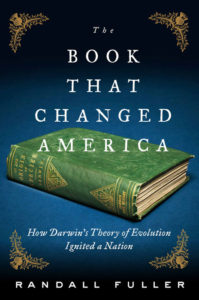 Just what exactly is it about Charles Darwin’s On the Origin of Species that caused – and indeed, continues to cause – so many Americans to lose their minds at the very thought of people reading it? (We’ll put aside the question of whether such people actually read it themselves, as experience has taught me that they generally haven’t.) But what of those Americans who didn’t recoil from it and who read it for themselves? What effect did Darwin’s ideas have upon them?
Just what exactly is it about Charles Darwin’s On the Origin of Species that caused – and indeed, continues to cause – so many Americans to lose their minds at the very thought of people reading it? (We’ll put aside the question of whether such people actually read it themselves, as experience has taught me that they generally haven’t.) But what of those Americans who didn’t recoil from it and who read it for themselves? What effect did Darwin’s ideas have upon them?
In his new book The Book That Changed America; How Darwin’s Theory of Evolution Ignited a Nation, Professor Randall Fuller considers the reactions to the ideas Darwin proposed in the book by such note-worthy nineteenth century American intellectuals as Bronson Alcott and Henry David Thoreau, as well as child welfare reformer Charles Loring Brace and abolitionist Franklin Sanborn. Are there discernible traces of Darwin’s ideas to be found in the writings and speeches of these men following their readings of Origin? Did they find what Darwin proposed challenging to their ideas about science, society, or even their own religious beliefs?
It will indeed be interesting to learn what Professor Fuller has discovered.
